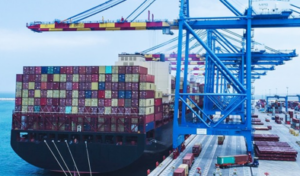By Buertey Francis BORYOR
Ghana is set to revamp the educational curriculum of its maritime training institutions to incorporate green shipping concepts, Chairperson of the Ghana Maritime Authority (GMA) Decarbonisation Committee, Ms. Georgina Adia Nyadia has said.
Speaking on Eye on Port programme, powered by the Ghana Ports and Harbour Authority (GPHA), Ms. Nyadia stated that, the move is part of efforts to prepare the nation for a future in sustainable maritime operations under the International Maritime Organisation’s (IMO) GreenVoyage2050 programme.
According to her, the shift towards green shipping requires a skilled workforce equipped with the knowledge to handle emerging technologies and sustainable practices.
“Green shipping is a new trend, and we need to build capacity to meet its demands. This includes updating our educational systems to prepare the next generation for the future of maritime operations. By enhancing the capacity of our maritime education institutions, we are not only complying with international standards but also positioning Ghana as a leader in sustainable maritime practices in the region. The Regional Maritime University (RMU) is where attention should be focused first,” she elaborated.
Additionally, she highlighted that the GreenVoyage2050 programme, which supports developing countries in reducing greenhouse gas emissions from ships, has selected the country as one of five nations to benefit from its technical and financial assistance. she added that, its proactive role in international maritime discussions and compliance with global standards played a significant role in securing this opportunity.
National Action Plan on Decarbonisation
Ms. Nyadia also said the National Action Plan (NAP) on decarbonisation, currently being worked on with stakeholder input, will guide the country in reducing emissions from ships.
The plan, developed in line with the IMO’s 2023 greenhouse gas strategy, outlines concrete policies and strategies to address emissions from ships operating in the country’s waters.
“The NAP is not just for the Ghana Maritime Authority. It is for the whole country. We are working with government agencies, private companies, and international partners to make sure it works,” she explained.
Technical Support from IMO
Ms. Nyadia moreover said that, under the GreenVoyage2050 initiative, the country will receive technical support in several areas, including the drafting of legislation, capacity building, and research into green fuels. She added that, the IMO’s assistance will help the nation update its domestic laws, particularly the Maritime Pollution Act, to match international standards.
“We have already domesticated parts of the International Convention for the Prevention of Pollution from Ships (MARPOL), but some regulations need updating. The IMO’s support will ensure our laws are in line with global best practices,” she furthermore said.

Economic Benefits of Green Shipping
She also mentioned that the programme will look into the economic benefits of green fuels for the country. She believes that if it can produce and supply green fuels, it could create new jobs and boost the economy.
“If we can produce and supply green fuels, it will not only reduce emissions but also create economic opportunities for the country,” she said.
She stressed the importance of collaboration among stakeholders, including government ministries, oil and gas companies, and the private sector, to achieve the goals of the NAP.
“Decarbonisation is a collective effort. Everyone has a role to play, and we are committed to working together to make Ghana a leader in green shipping,” she stated.
involvement in the GreenVoyage2050 programme is a big step towards a cleaner and more sustainable maritime industry. It also shows the country’s commitment to fighting climate change on a global level.
Ms. Nyadia also said, the country’s participation in the GreenVoyage2050 programme marks a significant step towards sustainable maritime operations, with the potential to transform its shipping industry while contributing to global efforts to combat climate change.










